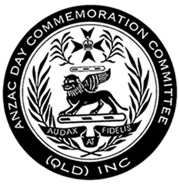A SHORT HISTORY OF THE ANZAC DAY COMMEMORATION COMMITTEE OF QUEENSLAND
By Arthur Burke
Following the successful withdrawal of Australian troops from the Gallipoli Peninsula in December 1915, a public meeting was called by the Mayor of Brisbane in the Exhibition Hall on 10 January 1916. Under the patronage of the Governor, this gathering manifested an idea from a member of the Queensland Recruiting Committee, Mr T.A. Ryan who proposed that the deeds of young Australians who brought the name ANZAC to world attention by their heroism should forever be commemorated.
Three motions passed by the public meeting provided the framework of a guiding charter: that the heroic conduct of Queensland's troops deserved fullest recognition, that the anniversary of the landing at Gallipoli be the date of celebration in Queensland and other States be invited to follow suit, and that a committee be appointed to bring these proposals to fruition. The organisation, known as the ANZAC Day Commemoration Committee of Queensland included the Mayors of Brisbane and South Brisbane, the State Premier and Leader of the Opposition, representatives from the Queensland Recruiting and Entertainments Committees, the State military and naval commandants, key church members and a cross section of government and business organisations.
Premier T.J. Ryan became chairman and Chaplain Lieutenant Colonel Canon D.J. Garland was appointed secretary. Membership of the Committee has changed over the years as some bodies ceased to exist, and as a chain of ex-service organisations came into being, notably in 1917 the predecessor of today's Returned and Services League of Australia. However, the ADCC has remained (uniquely in Australia) a non aligned, bipartisan, patriotic citizens organisation with Service representation.
The first observance of the sacrifices made by Queensland's sons came to fruition on 25 April 1916 with morning church services, a combined veterans and military parade and evening gatherings around 9 pm, at which time the whole State paused for one minute's sacred silence. By the ADCC's encouragement, other commemorations were held throughout Australia and New Zealand and in London. Promoting the spirit of the ANZACs, especially through the education of our youth remains the prime object of the Committee.
Though the post war recognition of the Returned Services organisation saw conduct of the ceremonial and march aspects of the commemoration pass to the veterans, the solemnity, protocols and the annual badge appeal have remained steadfastly with the citizens' ADCC under the chairmanship of the State Premier with the Leader of the Opposition as the vice-chairman.
Blue commemorative ribbons were sold at cost to the public attending the 1916 march in Brisbane. In keeping with the wave of patriotism which accompanied the march, however, the spectators donated more than the set price for the badges and the profits were held in trust for the care of graves at Gallipoli. When the Commonwealth War Graves Commission was established by Royal Charter in 1917 and took over this responsibility, the financial objects of the ADCC were realigned towards memorials construction and veteran welfare, especially those graves in Australia not recognised by the Repatriation Commission.
In 1921, following ADCC representations, 25 April was constituted as a national holiday which provided demanding restrictions banning race meetings, liquor sales and any public entertainments. It was not until 1931, however, that a 'close' or industrial holiday was finally gazetted. Since 1921 custom had acknowledged the rituals of the Anglican and Roman Catholic Churches by observing ANZAC Day on a Monday when 25 April fell on a Sunday. It took until 1937 before 25 April was firmly accepted as the only day on which commemorations would be held. Despite the application of the term 'holiday', ANZAC Day remains the Holy Day as originally envisaged. Solemn services, solemn music and flags half-mast all tell of a people who would show to those who suffered that we do not forget.
The ANZAC Day Commemoration Committee of Queensland was created by citizens as a gift of the people to perpetuate this solemn remembrance of the first ANZAC Day, and all the ideals and the sacrifice for which it stands. The Spirit of ANZAC is an intangible, unpredictable and unquenchable thirst for justice, freedom and peace which was epitomised at Gallipoli by deeds of comradeship, courage and sacrifice: others before self. This is needed today and every day and must be preserved at any cost.
For more information about ADCC and it's sevices kindly visit our about us page.






